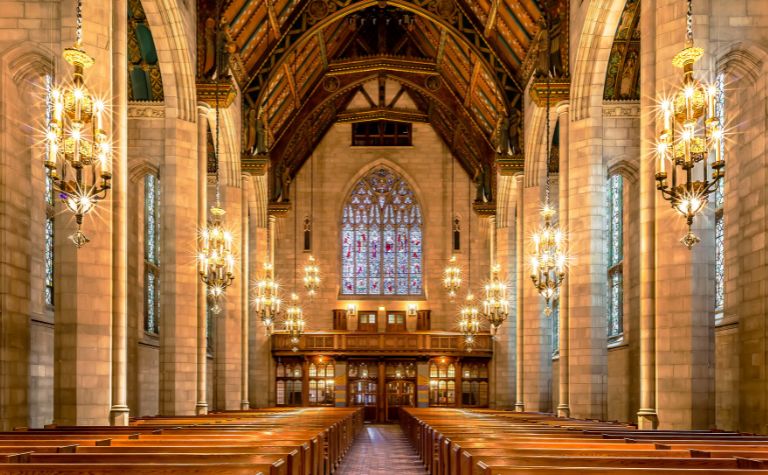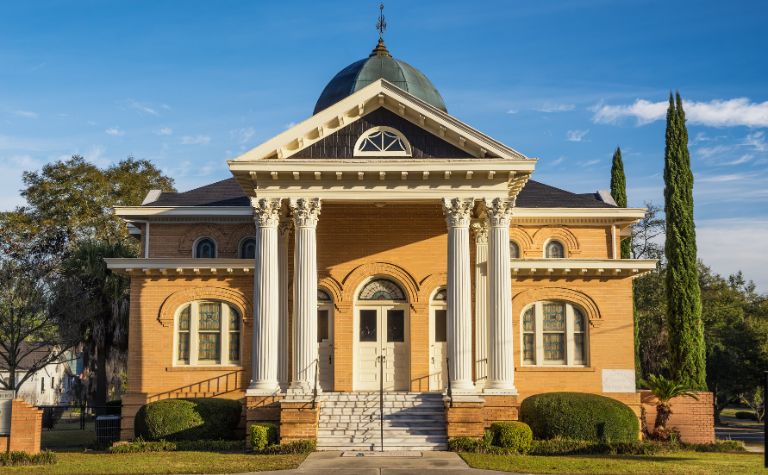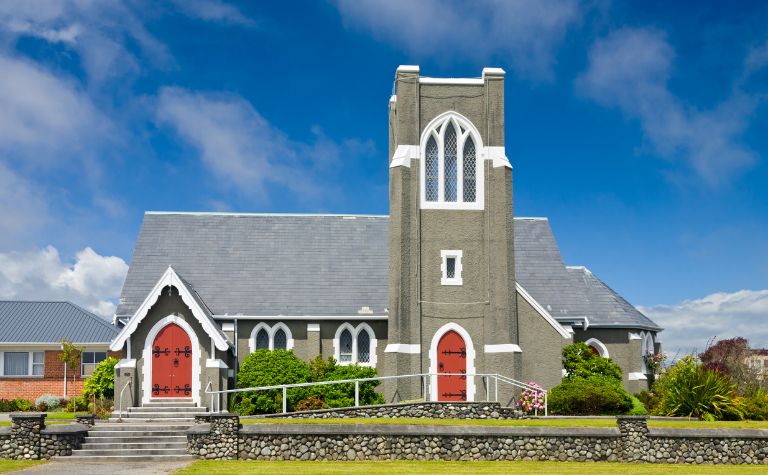In 2009 the Presbyterian branch of Protestant Christianity celebrated its 500th anniversary, as its origin dates to the birth of French Reformer John Calvin (1509-1564). The Presbyterian church has experienced many changes in the last five centuries. Many people today wonder if Presbyterians are liberal or conservative.
Historically, Presbyterians are theologically and socially conservative, yet in the 19th and 20th centuries, certain denominations and churches in the tradition adopted liberal beliefs and practices. Divisive issues included freemasonry, Darwinian evolution, the ordination of women, and same-sex marriage.
How are conservatism and liberalism defined in the Presbyterian tradition? What issues divide the opposing worldviews? Which Presbyterian denominations are conservative, and which ones are liberal? How do the churches that have drifted apart from the historical teachings of Calvin think of their founder today? Keep reading to learn more.

Conservative and Liberal Views in the Presbyterian Church
Conservatism and liberalism, in the context of a Christian denomination, can be discussed under two headings. The first one is familiar to any society. The second one is mainly found in the Church. (Also see Presbyterian vs. Roman Catholic: What’s the Difference?)
- Social issues: Most of the time, when conservatism and liberalism are discussed in the world, the context is political. Examples of social issues are taxes, immigration, abortion, and racial equality. Like other Christian traditions, Protestant churches engage in social issues through discussion, ministry, and other avenues.
- Theological issues: The terms “conservative” and “liberal” also apply to doctrine. Like discussions about social issues, liberals sometimes charge conservatives with outdated beliefs, and conservatives charge liberals with unethical progressivism. Conservative and liberal theological positions are often founded upon how people interpret and apply the Bible to life. (Also see Are Presbyterians Calvinists?)
Divisive Issues In the Presbyterian Denomination
Conservative and liberal issues are sometimes relative to social and ecclesiastical contexts. This doesn’t mean the morality of each subject is relative, but that issues arise in various ways at different times. Here are two examples:
- King James Version: At certain points in Protestant history, using an English translation other than the King James (KJV) would have been considered liberal. Today, many conservative Bible readers use non-KJV translations. (Also see the full article What Bible Translation Do Presbyterians Use?)
- Electric instruments: Similarly, at specific points in Christian history, using drums and musical instruments that used electrical power would have been considered worldly. Today, many churches, no matter the denomination, use powered instruments.
Doctrine is different: The two examples above relate to customs, not doctrines. Customs are often unique to a particular time and place but aren’t inflexible.
Doctrine, however, isn’t inflexible, according to conservative Presbyterians, which makes many of the issues below especially controversial. (Also see Presbyterian vs. Baptist: What’s the Difference?)
- Freemasonry: In the 19th and 30th centuries, the Presbyterian tradition wrestled with church members participating in “secret societies,” especially the Freemasons. The conservative position is that such societies are unholy and worldly. The liberal view argues there is no harm in such societies. Dozens of Protestant denominations articulated formal statements about such groups, encouraging members to avoid them. Several Presbyterian denominations maintain statements about secret societies in their doctrine.
- Darwinian evolution: How should Genesis 1-2 be interpreted? Should the Church adopt the consensus views of modern science? Presbyterians have wrestled with these questions since the latter half of the 19th century. The conservative view believes the creation account should be interpreted literally. The liberal (some would say moderate) view adopts Darwinian evolution.
- The ordination of women: Should women be pastors? Can they be elders of any kind? Presbyterians have wrestled with this issue for decades. Generally, the conservative view is that women shouldn’t be ordained, and the liberal view is that they can be. However, a few conservative Presbyterian denominations now allow individual churches to decide whether or not to call a woman to the office of elder. (Also see How Do Presbyterians Worship?)
- Same-sex marriage: Like other Christian traditions, Presbyterianism has traditionally defined marriage as between one man and one woman. This centuries-long conviction began to erode in some Presbyterian denominations in the 21st century as the liberal viewpoint acquired significant momentum in society. This issue split Presbyterian denominations and churches and continues to have a titanic impact on the tradition.
- Gender identity: Another issue being heavily discussed in the 21st century is gender identity and transgender issues. The conservative view believes God created two genders, male and female. The liberal view believes that gender identity can evolve in an individual’s life. These discussions impact the ongoing debate about who can be ordained in the Presbyterian tradition and what marriages churches can perform and recognize.

What Presbyterian Denominations Are Liberal or Conservative?
The list below is a starting point for readers. It isn’t intended to be exhaustive. Readers are encouraged to explore the websites for each denomination to learn more about their convictions. (Also see Presbyterian Church USA vs. Presbyterian Church in America: What’s the Difference?)
| Christian Reformed Church in North America | |
| View of Creation | View of Creation |
| Ordination of Women | each presbytery can decide for themselves |
| View of Marriage | between one man and one woman; opposes same-sex marriage |
| Associate Reformed Presbyterian Church | |
| View of creation | open to non-Darwinian views of the creation account; boundaries of acceptable creationism doctrine have been discussed in recent years |
| Ordination of Women | heterosexual men only |
| View of Marriage | between one man and one woman; opposes same-sex marriage |
| ECO: A Covenant Order of Evangelical Presbyterians | |
| View of Creation | open to non-Darwinian views that affirm that people are created in the image of God |
| Ordination of Women | one of the few conservative Presbyterian denominations that permit the ordination of women; split with PCUSA over LGBTQ ordination |
| View of Marriage | between one man and one woman; opposes same-sex marriage |
| Evangelical Association of Reformed and Congregational Churches | |
| View of Creation | not included in their statement of faith |
| Ordination of Women | allows the ordination of women; each congregation can decide for itself |
| View of Marriage | between one man and one woman; split from the United Church of Christ over the issue |
| Evangelical Presbyterian Church | |
| View of Creation | open to non-Darwinian views that affirm that people are created in the image of God |
| Ordination of Women | allows; considers it a non-essential matter |
| View of Marriage | between one man and one woman |
| Orthodox Presbyterian Church | |
| View of Creation | open to non-Darwinian views that affirm that people are created in the image of God |
| Ordination of Women | heterosexual men only |
| View of Marriage | between one man and one woman |
| Presbyterian Church in America (PCA) | |
| View of Creation | open to non-literal interpretation of Genesis 1-2; well-known pastor Tim Keller participates in BioLogos, which espouses “evolutionary creation” [1] [2] |
| Ordination of Women | heterosexual men only |
| View of Marriage | between one man and one woman |
| Presbyterian Church (USA) | |
| View of Creation | open to any position |
| Ordination of Women | practices women and gay and lesbian ordination |
| View of Marriage | supports same-sex marriage |
| Protestant Reformed Churches in America | |
| View of Creation | open to non-Darwinian views that affirm that people are created in the image of God |
| Ordination of women | heterosexual men only |
| View of Marriage | between one man and one woman |
| Reformed Churches in America | |
| View of Creation | open to any position |
| Ordination of women | allows |
| View of marriage | supports same-sex marriage |
| United Church of Christ | |
| View of Creation | open to any position |
| Ordination of Women | allows |
| View of Marriage | supports same-sex marriage |
| United Reformed Churches in North America | |
| View of Creation | open to non-Darwinian views that affirm that people are created in the image of God |
| Ordination of Women | heterosexual men only; split with the Christian Reformed Church in North America over the issue |
| View of Marriage | between one man and one woman |

What Do Liberal Presbyterians Think of John Calvin?
While the doctrines of the Christian faith that Calvin articulated can still be found in liberal Presbyterian churches, they aren’t taught or emphasized in the church’s ministry. Calvin himself, though a fascinating historical figure, is considered outdated. (Also see Why Do Presbyterian Churches Have Red Doors?)
To many liberal thinkers, the tradition has evolved to become something better. Calvin is viewed as a historical figure from America and Europe who played a role in establishing an institution, but their views are mostly irrelevant today.
References:
[1] Source
[2] Source
[3] Source
Learn more
The Presbyterian and Baptist traditions are influential Protestant denominations that have left their mark in Europe, America, and worldwide. The traditions agree on many important matters of faith...
Protestant and Presbyterian are two terms associated with Christianity, but many people aren't sure what the differences are between them. Some people know that neither Protestants nor Presbyterians...
